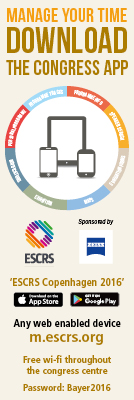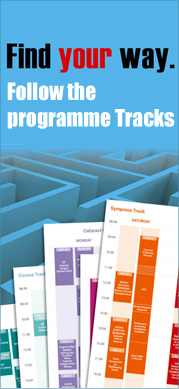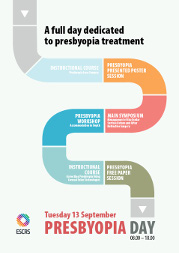Evaluation of a rotational asymmetric multifocal intraocular lens with a standard toricity and a +1.5 D near addition
Session Details
Session Title: Pseudophakic IOLs: Multifocal II
Session Date/Time: Tuesday 13/09/2016 | 08:00-10:30
Paper Time: 09:36
Venue: Auditorium C6
First Author: : F.Kretz GERMANY
Co Author(s): : H. Kaymak R. Gerl M. Mueller G. Auffarth M. Gerl D. Breyer
Abstract Details
Purpose:
Clinical evaluation of a rotational-asymmetric multifocal intraocular lens with a standard toricity and a +1.5 D near addition for the correction of presbyopia and astigmatism during cataract surgery.
Setting:
multi center study of the International Vision Correction Research Centre Network (IVCRC.net), Univ. of Heidelberg, Germany
Methods:
In a prospective multicenter study patients patients that underwent cataract surgery with a corneal astigmatism ≥ 0.75 D receives a rotational-asymmetric multifocal intraocular lens with a standard toricity and a +1.5 D near addition (LS-313MF15 T1-T6, Oculentis, Germany). The preoperative biometry was performed with the IOL-Master 700 (Carl Zeiss Meditech, Germany). Subjective refraction, corrected and uncorrected visual acuity, monocular and binocular [decimal] for distance, intermediate and near as well as binocular defocus curve analysis and rotational stability were evaluated.
Results:
A significant reduction of astigmatism from -1.36 D to -0,25 D could be found. The mean postoperative monocular UDVA was 1.06, the UIVA was 1.02 and the UNVA was 0.51, respectively. Mean IOL rotation was 1.6°.
Conclusions:
Rotational-asymmetric multifocal intraocular lenses with a standard toricity and a +1.5 D near addition based on a plate haptic design show an excellent rotational stability and sufficient astigmatism correction even for small grades of astigmatism. The evaluated +1.5 D near addition MIOL shows his benefits for distance and intermediate visual acuity while still offering acceptable near visual acuity.
Financial Disclosure:
... receives consulting fees, retainer, or contract payments from a company producing, developing or supplying the product or procedure presented, ... travel has been funded, fully or partially, by a competing company, ... travel has been funded, fully or partially, by a company producing, developing or supplying the product or procedure presented, ... research is funded, fully or partially, by a competing company, ... research is funded, fully or partially, by a company producing, developing or supplying the product or procedure presented, ... receives consulting fees, retainer, or contract payments from a competing company





